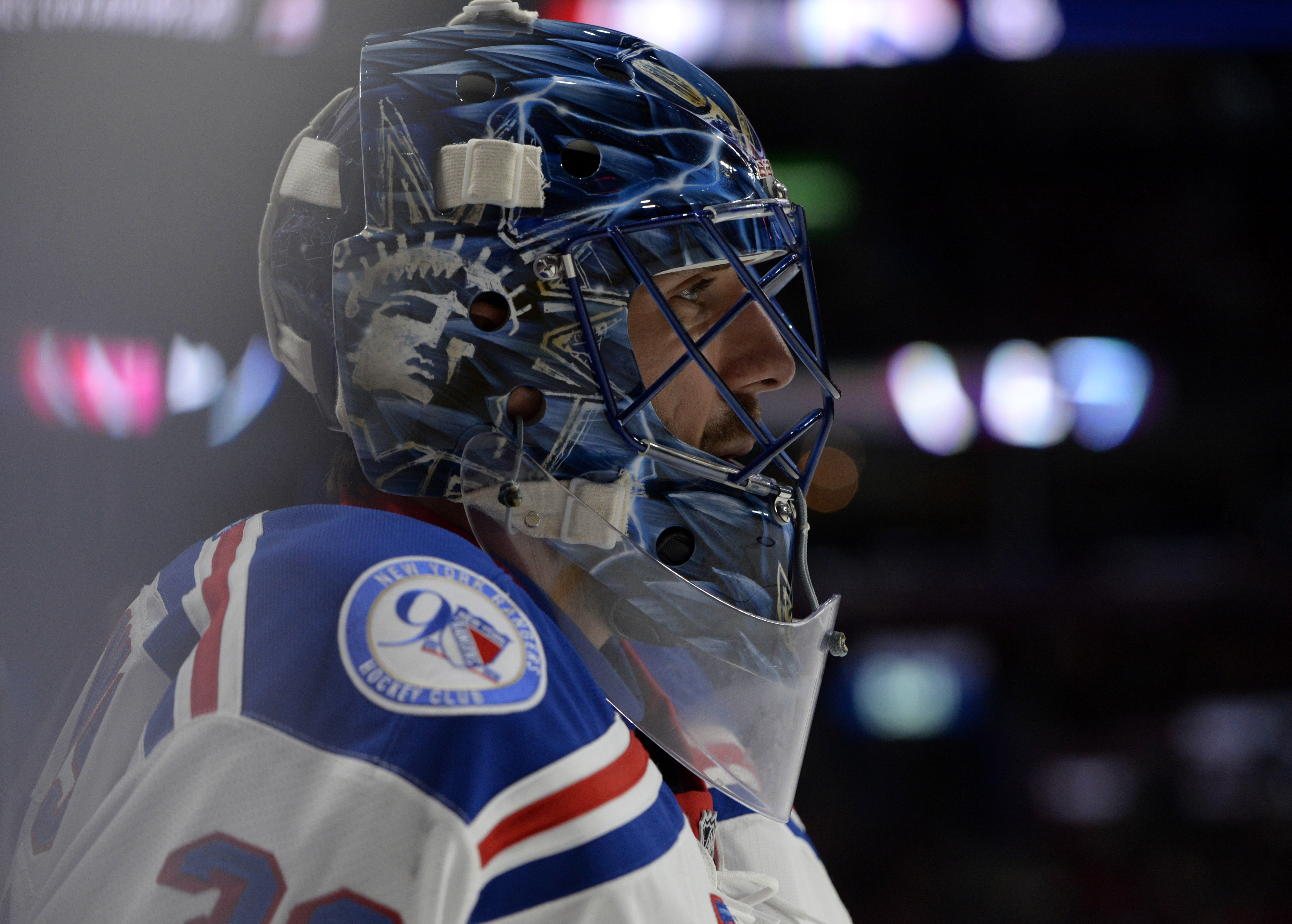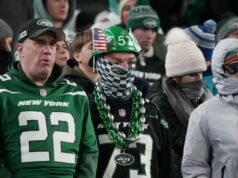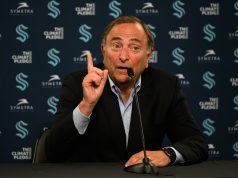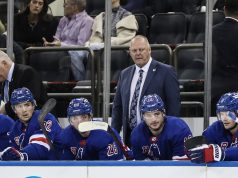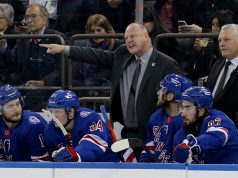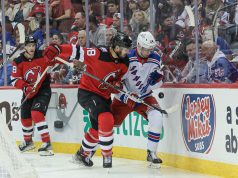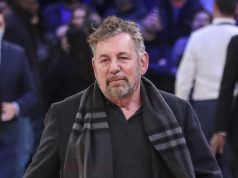Carl Hagelin is in Anaheim, Cam Talbot is in Edmonton and Henrik Lundqvist is still the face of the New York Rangers. Obvious moves, right?
Blasphemy is a word closely tied to team sports.Every so often a player becomes so great, so phenomenal that the term fan-favorite is used as an understatement. That guy becomes part of the fabric of the organization, the city.
He actually becomes the city… in a special sort of way.
For Madison Square Garden and the city of New York, Henrik Lundqvist is that guy and blasphemy is the perfect word to describe looking to ship him out of town.
The arguable best goaltender in New York Rangers history is coming off of another splendid Stanley Cup Playoffs run. His 11-8 record, 2.18 goals against average and sparkling .928 save percentage were better marks than the year prior, which saw him take the Rangers just three-games short of a championship.
He’s a Vezina Trophy winner, a future Hall of Famer and one hell of a guy (by most accounts). Their Game 7 loss to the Tampa Bay Lightning was nowhere near his fault.
Perhaps this is why most deem him untouchable. Why, though, when there is possibly a better hand to play?
Rewind the clock almost three-decades. Edmonton Oilers center Wayne Gretzky was the best thing in the NHL, literally, since sliced bread. The stuff he came up with on the ice marveled even the casual onlooker.
He captained his Oilers to four Stanley Cups and surpassed the 200-point mark a filthy four-times in five-seasons.
He was the city of Edmonton. He was literally the only thing they had.
Despite the strong sentiment, Oilers owner Peter Pocklington sent utter shockwaves that still haunt the hockey gods as we speak. He traded The Great One to the Los Angeles Kings.
Whether it was a case of (NHL) minds coming together to better the sport or not, the unthinkable actually had just occurred.
If Gretzky can be traded, why couldn’t Lundqvist?
While it’s a moot point now—thanks to Glen Sather shipping Cam Talbot to those very same Oilers for a less than stellar return (second-round pick and two other selections), the smarter strategy would’ve been to trade Lundqvist and keep Talbot for the long haul.
Play hardball with Lundqvist, a man who owns a no-trade clause, and tell him the organization wants to move in another direction.
Nobody is doubting Lundqvist’s greatness. Sometimes even the greats don’t capture championships in this sport that takes a collection of guys to come together as one at the right moment.
Championship or not, the guy has been outrageous since his rookie season in 2005-06. Furthermore, if there’s one team in the NHL that has projected championship qualities despite not finding the promised land, it’s these Rangers.
No matter, though. Trading Lunqvist’s $8.5 million salary at his ripe old age of 33 would have been the smart money, via Spotrac.
Right off the bat, it’s easy to realize one of 30 would have welcomed him in with open arms. Sure he’s 33, and yes $8.5 million is a big hit against a very strict cap, but this guy is arguably the best goaltender in the game—a position that allows hockey teams to snatch victory from the jaws of defeat on any given night.
The first direct positive would be the fact that New York would escape from the backend of this lengthy deal that runs through the end of 2021. I’m not the sharpest tool in the shed, but realizing that Lundqvist’s final two or three seasons on this deal won’t garner proper return on investment is an easy thing to forecast.
Furthermore, the Rangers had a ready-made starting goalie waiting in the wings. Talbot wasn’t just serviceable during his time with the Blueshirts, he was phenomenal.
Thanks to the 28-year old Ontario-native, the Rangers pushed through troubling times with Lundqvist injured and captured the 2014-15 Presidents’ Trophy. He also took home the most revered honor in Rangers-Town: the Steven McDonald Extra Effort Award.
It seemed almost too good to be true. Oftentimes when hockey clubs are transitioning from one goaltender to the next, a transition period takes place. One that has fans pulling out their hair at every turn.
With the Rangers, this transition (if they had gone this route) could have been ultra smooth. How could any right-minded individual think differently after Talbot put up a 21-9 mark, 2.21 GAA and 9.26 SV% last season?
Talbot’s salary for the upcoming season is a paltry $1.45 million, thanks in part to a smart move on Sather’s end to extend him early last year.
Think about how much money $7.05 million could get you in terms of skaters. Not only would the blueline remained stacked with guys like Ryan McDonagh, Marc Staal and Dan Girardi, but the top-nine forward base wouldn’t have been downright scary.
Carl Hagelin, the rangers most under-appreciated player, would still be a Ranger.
Many general managers around the league have already began taking notice. Spending such a large portion of the cap on your goalie doesn’t seem to be netting championship results.
Take the Chicago Blackhawks, for example.
The latest dynasty in the NHL doesn’t have a great goaltender. They don’t even have an all-star quality guy (even though he did appear in the 2015 version). Chicago rolls out Corey Crawford, a guy who looked so terrible early on in the postseason that he was benched.
Crawford is currently making $6 million annually on a six-year deal he signed a season ago. Prior to that contract he made peanuts, yet they still won. The Blackhawks built a core with extra money saved against the cap due to not paying an ridiculous sum to their goalie.
Take a look at the Anaheim Ducks who most considered the best team in the playoffs.
Their starting goalie, Frederick Anderson, is currently raking in just $1.15 million per. Granted he’s just 25 and will eventually garner more money should he continue to develop (just as Talbot would), but the immense cap relief the Ducks are afforded is worth its weight in gold.
Better yet, let’s take a gander at the roster of the Tampa Bay Lightning.
Ben Bishop is a shaky goalie who just beat Lundqvist and the Rangers to win the Eastern Conference Finals. Nothing about the guy screams talent, yet the Lightning had the luxury of extra cap space due to Bishop’s lower-scale $5.950 million salary.
Part of the reason Steve Yzerman could afford Ryan Callahan, Anton Stralman and Brian Boyle is due to this structure.
On the other end of the argument lies the Kings, the squad who bested New York during the 2014 Stanley Cup Finals.
Jonathan Quick (along with Carey Price) are the only two guys right up there with Lundqvist in terms of goalie respect in around the league. The Kings are two-time champions, and they employ the superstar-goalie strategy.
However, there’s a major difference here between Quick and Lundqvist. Quick is still only 29-years old and makes just $5.8 million per season which pales in comparison to the poor deal that is Lundqvist’s (at 33-years old and $8.5).
The Kings, even with a superstar goalie, aren’t getting hit over the head as rough as Sather is.
Come to think about it, I haven’t seen the Montreal Canadiens ($6.5 million per season for Price) winning championships, either. Just like New York, they’re hurting to build a better skating group around that stud, MVP goaltender of theirs.
Lundqvist’s contract isn’t just rich, it’s flat-out nuts even in comparison to other great goalies.
Not only would Talbot have filled in nicely moving forward, it would have allowed eventual general manager Jeff Gorton to start off on the right foot.
Plus, what better way to jump-start Alain Vigneault‘s offense than with Talbot’s slick stick-handling (which is a very underrated goalie attribute in today’s game).
Yes, the word blasphemy might have been thought of a few times while reading this mix-mosh of words we just presented, but it was the same word Edmonton Oilers fans thought of in 1987.
And despite that word they still won a championship just three-years later.
If the Oilers did it, the Rangers sure could have as well. It’s now up to you Hank; time is ticking on your Patrick Ewing-like New York professional sports career.


